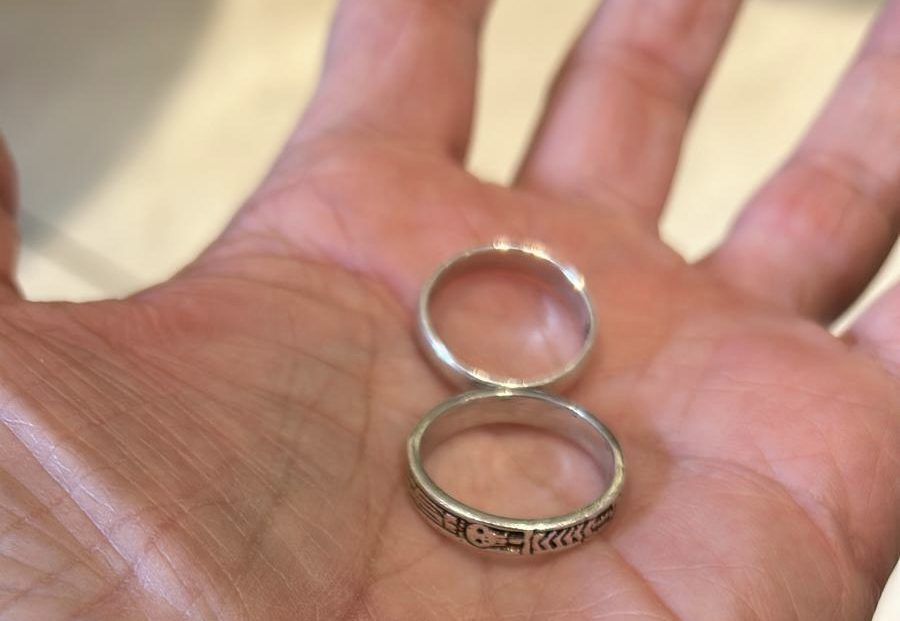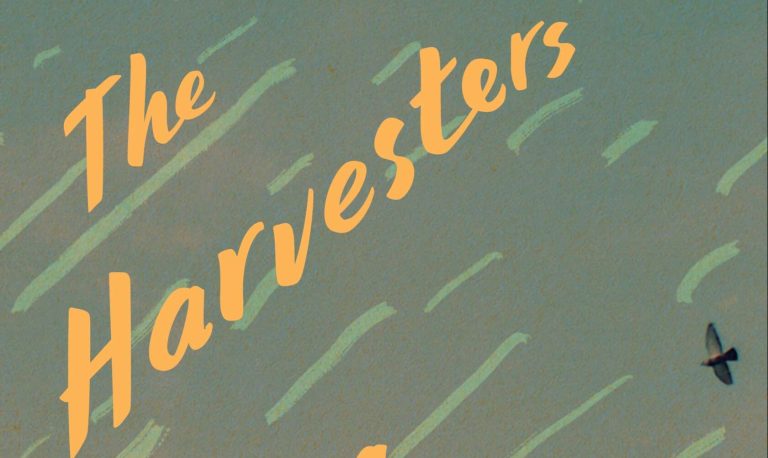For years I’ve worn an oversized memento mori ring on the secure side of my tight-fitting wedding band. The rattle continually reminds me of the commitment I chose, but I’ve mostly ignored the memento mori ring. It’s been the clapper in the bell, noisy but invisible, essential but forgotten.
Then, just two weeks ago, a doctor I’d just met reminded me why I bought the larger ring. I cried pity for a few days and consoled my wife for a few more, and then I finally meditated on the meaning of the ring. My days will end. I will end. These two sentences—just seven words—are the check delivered at the end of an exquisite meal. Time remains, but not much, and the bill is on the table.
As you know if you read last week’s installment of “A Work in Progress: Writing from Death Row”, I’ve decided to embrace memento mori. I’m still working out what that means, but I know the first step is to decide which of my writing projects to continue. Old Testament heresy? Historical fiction with vampires? Southern Gothic 1980s Mississippi? Cajun magical realism? Chick-lit tragedy?
The first of these projects is Book of Adam, Gospel of Eve, a heretical retelling of the Garden of Eden. I started writing it eight years ago, and I’ve put it down in frustration every time I’ve restarted it. In the first passage of “Book of Adam,” the child Adam awakens in the garden and spends his first day frightened and alone, searching for his father. In this passage and on every page I’ve written since, I delighted in insulting Christianity, Islam, and Judaism.
In childhood, I was told I would never die. With true convictions—real, lived beliefs—I would live eternally in paradise. If I got it wrong, I’d spend eternity in flames that burn but do not consume. Despite the bodies I saw lying before the altar at funerary masses, I would live forever.
Then, in sixth grade, Mrs. Simmons taught us ‘both sides of evolution.’ When the time came to pick a side and defend my position, I chose the side that seemed self-evident. I started with mankind, the pinnacle of life, naturally selected generation by generation to understand problems and imagine solutions. From there I imagined a child my age thousands of years ago, standing over the body of a dead parent. Like me, that child was using her imagination to solve a problem.
What an amazing gift it is to have a creative mind. Sure, if God created us, we should thank him for our creativity and our will to self-preserve. It could have happened that way, but didn’t it seem more likely that we created god? That long dead child must have used her creative problem-solving to defeat death by creating a god to give us eternal life?
Mrs. Simmons enjoyed my take on creation vs. evolution, but somehow Sister Ann heard about it, and the tone of science class changed for the rest of the sixth grade. Perhaps god told Sister Ann about it, but I think it was John Schlottmann’s mother. Whoever it was, my first novel start, which is now 200ish pages long, is an attempt to settle scores from the battle that started in sixth grade and ended during a Catholic youth retreat late in my senior year of high school.
It’s been so long and the battle is won. It was won decades ago. Why would I keep fighting it? Is having a great idea for a novel enough? No. My answer is no. Maybe it’s because I have other ideas that are more salable. Maybe it’s because the battle has been won. Whatever the reason, I know this is not the project for me to work on now.
The second project is Quarters. It’s also from my school days, but it is not a battle that was won. Elisa from my Sunday writing group talked about a story she’s been rewriting since high school. I liked the sound of that, and I decided to have a look at the oldest piece of my writing that I still have. (In late 1986 I burned everything from school I could find, even debate trophies, but somehow a terrible short story survived the purge.) In July 2023 I started editing a story I wrote in 1985, and by the end of the month, I had written a new story.
In the edit that became a rewrite that became a new story, the work became more personal, even as it shifted away from autobiography. The ’85 version was about racism, but the ’23 version is about love. The narrator, a white high school freshman boy with a racist, worthless father, is in love with a middle-class black girl. The boy’s father decides to run down the girl’s pitbull with his rustbucket truck, and his plan goes poorly for everyone but the dog.
The 5,000-word story is pretty good, I think, though I’m sure it would benefit from another pass. It takes place in the first few days of ninth grade, and the idea is that I’ll write 15 more short stories, one occurring in each quarter of high school. I’ll tell the story of the star-crossed lovers and the bullshit their families throw at them. In the end, all are punished…the young for being hopeful and the old for losing hope.
Quarters has commercial potential and it’s a battle that still rages, but it’s not my fight. It should have been, but it would be posturing to take it up now. Maybe someday.
The third project is Gris Gris. I love this project. I read The Murmur of Bees and had the good luck of talking with the author, Sofia Segovia, individually and in a group setting, about her work. I was inspired by both her take on magical realism and her use of exploratory writing to compose a full draft of a novel, so I started writing without a plan, just a single character in mind. That character, an 80-year-old Haitian-Creole woman named Mercier, told me a story about Gris Gris, her great-great-grandson, and then I had two characters.
Gris Gris, I realized, is my main character. He’s 1/16th Creole mixed with Louisiana Acadians. Like me, he was born in the late 1960s, and I am 1/8th Acadian. Like my grandfather, his great-grandfather tried to raise his children without a taste of any French culture. His great-grandfather succeeded in most of the ways my grandfather did, but he failed in one important way: he stayed in Thibodaux, Louisana.
All of this is fascinating to me and the writing has been exhilarating, but I’m not sure why I’m writing it. Me, a white guy who lives in Hawaii, writing as a black female mystic born in 1888, is absurd. She can be a character, but how could I write from her perspective? I can write from Gris Gris’s perspective, but why would I? Maybe Gris Gris has something to teach us, but I haven’t figured out what it is or what it might have to do with Cajun or Creole cultures. The only element of the Cajun culture I’ve cherished is the part my grandfather allowed my mother to cherish: the food. And honestly, I cling to the food because it’s delicious, not because it’s Cajun.
Whatever I can say with Mercier and Gris Gris can be said without fetishizing a culture I know almost nothing about. Sometimes, a writing exercise is just a writing exercise. I’ll take what I’ve learned and move on.
The fourth project is We. It also started as a writing exercise. In this case, the exercise was for a course in short story writing. The instructor was terrible—a great writer but nearly useless as a teacher—and so I needed to juice up the assignment to make it interesting enough to justify the time it would require.
In We, a married couple is having trouble connecting. An event from their past that neither of them understands has dropped a wall in the middle of what had been a miraculous union. Then, one Sunday morning, while having breakfast at their favorite restaurant, a building falls on them. She is crushed, but he survives. The conceit of the novel is that she is dead but not gone. She joins him in his body. He hears her speak, and she senses everything he senses, but she can’t control what his, now their, body does.
They still do many of the things they did before. They fight, eat out, laugh at old jokes, talk about what they’re reading, have sex, etc. They face the same struggle, but she feels she’s got less at stake now, and he’s inherited tools: her diary, her confidante, and a hidden key that unlocks the past for both of them.
We is intensely personal. It’s about a battle I’ve fought and won. Frank, my proxy in the couple, has lessons to teach us about universal themes. These aren’t lessons I arrogantly dispense from some imagined, inherent wisdom; they’re hard-won perspectives I would exchange years of life to share with my younger self. Literally, years.
Why did I need to write an article to see the obvious choice?
When I typed that last sentence, I thought it was a rhetorical question and the concluding sentence of the article, but it needs an answer.
I wrote this article to explore the abstractions of a simple, essential question: What should I write? Non-abstract events follow this whispy decision, and there are many factors to consider: commercial potential, nearness to completion, cultural appropriateness, and the current zeitgeist in publishing, to name just a few.
In searching for the answer, I found that I was asking the wrong question. Before deciding what to write, I had to remind myself why I needed to write in the first place. I write to make sense of the world, to explain the world to myself. There’s arrogance in writing for an imagined audience, but there’s also a humble vulnerability in the work. Each story I might write held power over me at some point in my life, but only one of them matters to me now. I’m not writing to make money or to create a legacy or to settle scores. I’m writing to put my affairs in order. I will probably fail, but I owe an honest effort to my wife and to myself.
I am working on the novel I need to write. It’s not particularly literary or creatively ambitious. It could never sit on a shelf with Joyce or Faulkner. It probably won’t even sit on a Barnes and Noble shelf. It’s nothing more than the novel I need to write.
Charge your Kindle. We may not be available at your local bookstore, but it will be available on Amazon. Heck, join the Story Street mailing list and I’ll send you an advance copy.
- SSW Interview of Our Summertime Sadness 100-Word Story Contest Winner - September 1, 2025
- A Work in Progress: Year One - April 8, 2025
- What I Learned Judging a Flash Fiction Contest - November 14, 2024
Sign up to our newsletter to receive new articles and events.




